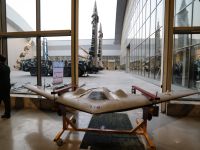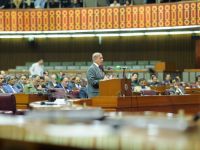In a surprise twist to the marathon Lockerbie trial, a Scottish court did a turnabout Friday and allowed a convicted Palestinian terrorist to take the stand for the prosecution, a move the defense attacked as a "spoiler" tactic.
Mohammed Abu Talb, a 46-year-old Egyptian army deserter and erstwhile member of the defunct Palestinian Peoples' Struggle Front (PPSF), is serving a prison term in Sweden for bomb attacks against Jewish organizations in Europe.
He obtained asylum in Sweden in 1983, and subsequently, citizenship.
Talb was was an early suspect in the Lockerbie bombing. But investigators abandoned that line of enquiry before the defendants, Libyan intelligence agents Abdel Basset Ali al-Megrahi, 48, and Al-Amin Khalifa Fhimah, 44, were indicted in 1991.
Pan Am flight 103, bound from London to New York, blew up over the small Scottish town of Lockerbie at 7:03 pm on December 21 1988, killing 259 persons aboard, mostly Americans, and 11 on the ground.
Talb, whose testimony presiding judge Lord Sutherland had ruled out earlier in the week to give the defense time to gather additional information to cross-examine him, acknowledged being in Malta in December October 19-26, about two months before the bombing, before returning to Sweden.
The prosecution contends the bomb the Libyans are accused of planting on the plane was assembled in Malta, flown to Frankfurt wrapped in clothing in a suitcase on a so-called "feeder flight," and was transferred at Frankfurt to the ill-fated Pan Am jet.
But the prosecution's one hour and 20 minute examination of Talb portrayed his Malta stay as an innocent visit with a baker friend, Abdu Salam.
Salam's brother, Asham, a clothing maker in Malta, gave Talb clothing samples to take back to his home in Uppsala, Sweden, where he lived with his wife and two children, to find prospective buyers, Talb testified.
On the night of the Pan Am bombing, Talb testified, he was at home in Uppsala caring for his two young children while his wife was at a hospital with her sister-in-law who was giving birth, he testified.
The defense objected to Talb's seemingly innocuous testimony, calling him a "spoiler witness" whose sole purpose was to blunt the force of the defense's cross-examination, which would have more force once additional information, was obtained.
Defense lawyer William Taylor told the court the defense would be recalling Talb for cross-examination "at such time as we procure the information we need."
Asked by Sutherland how long that might take, Taylor replied: "As long as it takes, your lordship. That's like asking, 'How long is a piece of string.'"
A spokesperson for the Crown prosecution said after the adjournment of Friday's half-day session, "We will be calling no further witnesses pointing at the two defendants, only those that can discredit the defense.
"Any other witnesses we call will be intended to blunt the special defense," said the spokesperson, referring to a defense that seeks not only to exonerate the defendants but to shift guilt to another party, in this case a Palestinian group or groups.
Talb testified he deserted the Egyptian army in 1976 and with the aid of a series of phony passports spent time in Jordan, Lebanon and Syria before immigrating to Sweden. He said he had been a member of the PPSF since 1976.
Talb's testimony is to resume next Tuesday.
The trial is being held under Scottish law at this former US military base, declared by the Dutch government as Scottish territory for the duration, under a complex multi-nation arrangement that persuaded Libyan leader Moamer Kadhafi to turn over the suspects -- CAMP ZEIST (AFP)
© 2000 Al Bawaba (www.albawaba.com)







